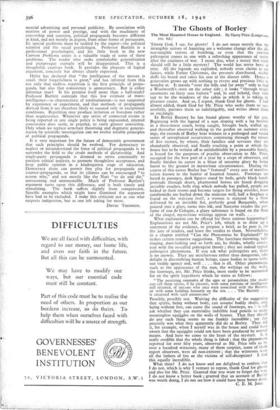The Ghosts of Borley , THANK God, I say, for ghosts!
I do not mean merely that the intangible terrors of haunting are a welcome change after the all- too-tangible terrors of bombing, or even that the craziest poltergeist comes to one with a refreshing appearance of sanity after the craziness of war. I mean also, what a mercy that there should still be a little mystery! The world has never been so trite. All the legends are exploded, nobody even claims to see fairies, while Father Christmas, the presents distributed, visibly doffs his beard and takes his seat at the dinner table. Hence generation grows up with nothing to revere and precious little to wonder at. It travels "over the hills and far away" only to find a Woolworth's store on the other side ; it looks " through magic casements on faery seas forlorn " and, lo and behold, they turn out to be the windows of the cabin in which it is taking its pleasure cruise. And so, I repeat, thank God for ghosts. I had almost added, thank God for Mr. Price who seeks them so suc- cessfully, pursues them so indefatigably, and writes about them so excitingly.
In Borley Rectory he has found ghosts worthy of his pen.
Beginning with the legend of a nun eloping with a lay brother in a three-horse coach, being caught, brought back, walled up, and thereafter observed walking in the garden on summer even- ings, the records of Borley bear witness to a prolonged and varied series of unexplained occurrences continuing through the tenure of five rectors, by whom, their families and servants they are abundantly observed, and finally reaching a point at which the house has to be written off as uninhabitable by a peaceable family, is leased for the purposes of psychic observation to Mr. Price, occupied for the best part of a year by a corps of observers, and finally finishes its career in a blaze of uncanny glory by being burnt to the ground in mysterious circumstances. During the course of this career Borley has " featured " every sort of manifes- tation known to the hunter of haunted houses. Footsteps are heard in passages, dark figures stand by beds, grisly black hands protrude through doors, phantasmal horses are heard dragging invisible coaches, bells ring which nobody has pulled, people are locked in their rooms and become targets for flying missiles, brass candlesticks are -hurled down the staircase well, half a fireplace is found on the staircase itself, a woman is stunned by a blow delivered by an invisible fist, perfectly good Burgundy, when poured into a glass, turns into ink, and Sauterne exudes the per- fume of eau de Cologne, a gluey substance is found on the floor of the chapel, mysterious writings appear on walls. . . .
What explanation can be offered for these curious happenings?
Explanations are not Mr. Price's job, which is to draw up a statement of the evidence, to prepare a brief, as he puts it, for the jury of readers, and leave the verdict to them. Nevertheless, in a chapter entitled " Can the Phenomena be Explained?" he makes certain tentative suggestions. The furniture throwing, bell- ringing, door-locking and so forth are, he thinks, wholly consis- tent with the so-called poltergeist theory ; they are indeed typical poltergeist phenomena. If you ask what poltergeists are, there is no answer. They are mischievous rather than dangerous, take delight in discomfiting human beings, cause bodies to move with- out visible agency and, well . . . . that is all. Other phenomena, such as the appearance of the nun, the writing on the walls, the footsteps, are, Mr. Price thinks, most easily to be accounted for on the spirit hypothesis which he states as follows :
" The persisting remnants of the egos or personalities (the reader
can call them spirits, if he pleases), with some portions of intelligence still retained, of persons who once were associated with the Rectory, or with some building formerly on the site. . . . The Rectory . . • is saturated with such emanations."
Possibly, possibly not. Waiving the difficulty of the suggestion that spirits, being without body, can assume bodily shape, and, being without feet, can cause the sound of footsteps, we r-n still ask whether they can materialise indelible lead pencils to make meaningless squiggles on the walls of houses. That they should do any such thing seems to me frankly incredible ; yet this precisely was what they apparently -did do at Borley. They did it, for example, when I myself was in the house and could have sworn that the squiggles could not have been produced by normal means. And here we come to the heart of the mystery. Is it really credible that the whole thing is faked • that the phenomena reported for over fifty years, observed as Mr. Price tells us by over a hundred witnesses, many of them sceptics, some of them expert observers, were all non-existent ; that the witnesses were all the fathers of lies or the victims of self-deception? I find this equally incredible. What then? I do not know and am delighted to confess that I do not, which is why I venture to repeat, thank God for ghosts and also for Mr. Price. Granted that you want to forget the war, I do not know a better book ; granted that an account of Borley was worth doing, I do not see how it could have been better done. C. E. M. Joao.






























 Previous page
Previous page